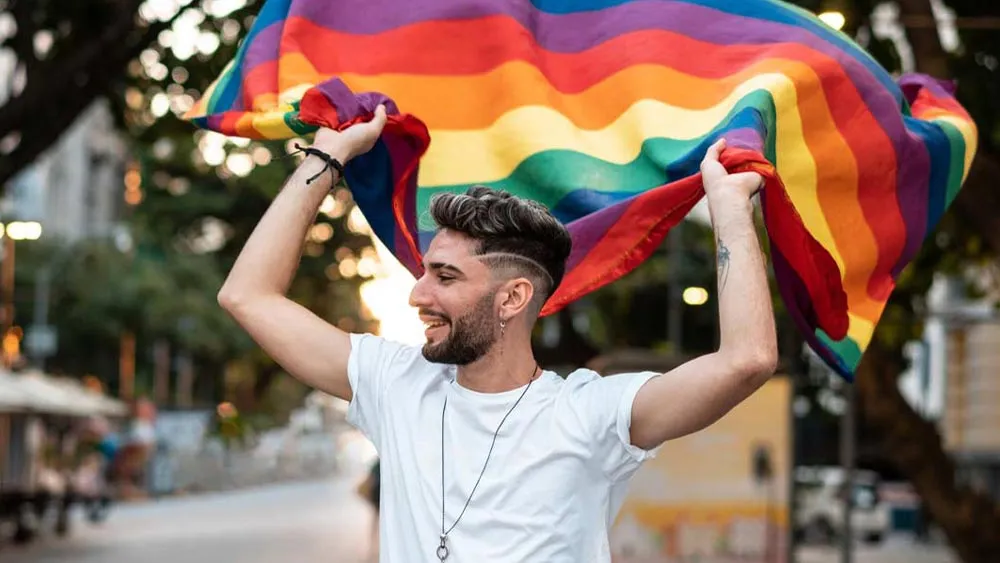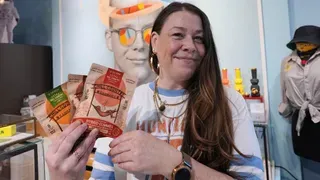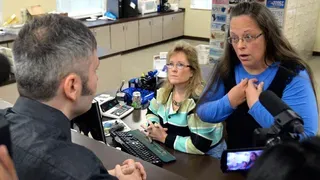February 13, 2013
The Obama Effect: Is the President Changing Public Views on LGBT Marriage?
Victor Yates READ TIME: 7 MIN.
At last night's State of the Union address, President Barack Obama made early references to a thriving middle class that could "get ahead no matter what you look like or who you love." This followed those historic statements during his second Presidential Inauguration that gay and lesbian people should be treated "like anyone else under the law," and a 180-degree turn in his views on same-sex marriage last May. Could changing the nation's views on marriage equality be as easy as a nod from the Commander-in-Chief?
"I think same-sex couples should be able to get married," said President Obama last May in an interview with Robin Roberts, becoming the first sitting U.S. President to endorse gay marriage. Since his endorsement, public opinion has also evolved, and same-sex marriage has become legal in Maine, Maryland, and Washington, bringing the total number of states that allows gay couples to get married to nine.
In December the first gay couple, Army 1st Lieutenant Ellen Schick and Shannon Simpson were married at the U.S. Military Academy's Old Cadet Chapel at West Point, after three years together. This was followed by the nuptials of Penelope Gnesin and Brenda Sue Fulton, a West Point graduate. And in recent elections, 10 LGBT politicians were elected, representing each group within the LGBT community.
During his second inaugural address, President Obama said, "We, the people, declare today that the most evident of truths -- that all of us are created equal -- is the star that guides us still; just as it guided our forebears through Seneca Falls, and Selma, and Stonewall..."
"It is now our generation's task to carry on what those pioneers began," he continued. "For our journey is not complete until our wives, our mothers, and daughters can earn a living equal to their efforts. Our journey is not complete until our gay brothers and sisters are treated like anyone else under the law -- for if we are truly created equal, then surely the love we commit to one another must be equal as well."
Is it possible that public opinion on gay marriage and LGBT rights changed after President Obama's endorsement of gay marriage? With recent newspaper headlines hailing Rhode Island's House approving gay marriage equality, Virginia passing a state bill protecting LGBT state employees from discrimination and Wyoming considering three LGBT bills, it appears that way. Or has public opinion on LGBT rights changed for other reasons?
Rhode Island House Passes Marriage Equality Bill
The signs of change can be seen in states throughout the nation. In Rhode Island, Rep. Arthur Handy, sponsor of H 5015, said the bill was "about fairness and allowing all Rhode Islanders to have equal access to the rights and responsibilities that come with marriage," after it was passed by the state's House of Representatives.
House Speaker Gordon Fox, co-sponsor of the bill, who is openly gay, said, "we are marching toward equality." Fox is one of four openly gay members of the Rhode Island General Assembly, with Senator Donna Nesselbush and Representatives Deb Ruggiero and Frank Ferri.
Rep. Handy introduced the bill eleven years in a row before it passed 51-19. The next step in H 5015 being signed into law is getting it passed through the Democrat-controlled Senate. If passed there, the bill will be sent to Governor Lincoln Chafee to sign into law. This bodes well, as Chaffee, a supporter of gay rights, said at a January 15 press conference that gay marriage was "long overdue" in Rhode Island.
Before the House voted on the bill, a Public Policy Polling survey found that 57 percent of Rhode Island voters supported legalizing gay marriage, while 36 percent were opposed. This is a big change from just a year earlier, when the North Carolina-based polling firm found 50 percent were in support, while 41 percent were opposed. According to the firm the increase could "reflect the national movement on this issue over the last few years."
Virginia Won’t Discriminate on Sexual Orientation or Gender Identity
Marriage equality has not yet come to conservative Virginia, but the blue state of Virginia's Senate did approve SB 701, a bill seeking to ban discrimination in hiring, promotions and firing against state employees based on sexual orientation and gender identity. The bill now moves to the Republican-controlled House of Delegates, which has 100 members with 67 Republicans, 32 Democrats and 1 Independent.
"No state employee should ever doubt Virginia's commitment to equal employment opportunity for all," said Senator Adam Ebbin, who led the bill and is the state's first openly gay senator.
But supporters of SB 701, like Equality Virginia, are concerned that the conservative House of Delegates will reject the bill and people like James Finley will continue to be legally fired for being openly gay. The decorated volleyball coach, who worked at Virginia Commonwealth University, was fired after leading his team on the school's best winning percentage. The red flags that he didn't see until he was fired included: the demotion of the openly lesbian Senior Women's Administrator, a 30-year veteran, to Senior Associate AD for Sports Administration, and the athletic director's pattern of avoiding and ignoring any contact with Finley.
"The bill is about making sure that no one in the state workforce should have to worry about being discriminated against because of who they are," said Senator A. Donald McEachin, who served in the Virginia House of Delegates for ten years. "I'm hopeful the House will look at the totality of the circumstances and see a way to pass it."
Equality Virginia is pushing for voters to persuade their Delegates to vote yes on the bill. On their website, voters can generate form letters that can be emailed directly from the charitable organization's site to Delegates.
Wyoming: Gay Marriage and Civil Union Bills
Things are moving slower in the red state of Wyoming, but evidence of progress remains. Two house bills, HB 168 and HB 169, were introduced to support gay marriage and civil unions. Both co-sponsored by State Rep. Cathy Connolly, House Bill 169, which authorized same-sex civil unions, defines marriage as a civil contract between "two natural persons," instead of between a man and a woman, as the state statute reads. House Bill 168 sought to broaden domestic partnerships without encroaching on the religious definition of marriage. Both bills were rejected in the Republican-controlled House, with 52 Republicans to 8 Democrats.
"We are better individually and collectively when our loved ones are protected," said Connolly, after the decision was made. The State Rep. is the first openly gay member of the Wyoming State Legislature.
According to The Williams Institute, a think tank at UCLA, 657 same-sex couples live in Wyoming, based on data from the 2010 U.S. Census. Wyoming is one of 29 States were workers can be legally fired, demoted, or harassed for being LGBT. But there might be hope in the future to secure greater rights for same-sex couples in the state, seeing that the domestic partnership bill passed in the committee and ultimately defeated in the House. That the bill made it to the House at all demonstrates that public opinion on LGBT rights is changing and having an impact on red states.
Various public polls have shown that gay rights supporters are young, vote Democrat, have a higher education, lack religious fundamentalism, and live on the West Coast and in the Northeast. With more religious associations and organizations, such as the Rhode Island Religious Coalition for Marriage Equality (representing more than 100 clergy and faith leaders), coming out in favor of LGBT rights, coupled with the President's support, maybe more supporters will come out in numbers.
Writer/blogger Victor Yates' first novel is being published by AddisonCraft Publishing. His writing has appeared in Windy City Times, GBM News, Qulture, Campus Circle, The Voice, The Catalyst, and Prism. Recently two poems of his were included in the anthology 'For Colored Boys,' edited by Keith Boykin. Yates has read at the West Hollywood Book Fair and the West Hollywood Library. He is also the winner of the Elma Stuckey Writing Award (1st place in poetry).






